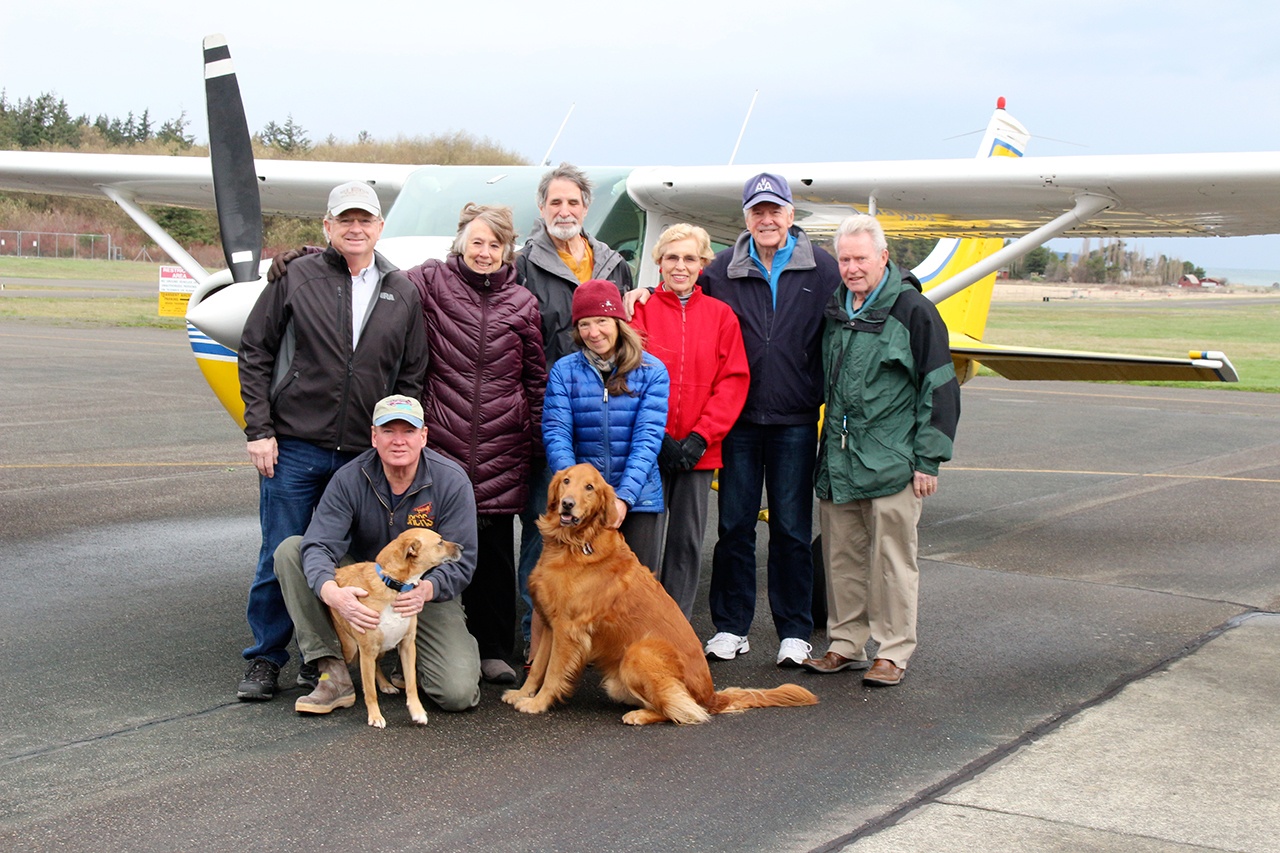Undergoing cancer treatment is a daunting prospect. For islanders, there is the additional stress of waiting in line and taking a ferry before they even make it to their appointment.
Orcas Island’s Mercy Flight program eases the pain of a cancer diagnosis by flying patients to medical visits for free.
“It made everything possible,” said George Post, who received multiple radiation treatments for a tumor in his lung over 10 days in Skagit County this past summer. “It was about as easy as it could have possibly been. Otherwise it would have meant spending a whole week off island and not being in the comfort of my home.”
The program began decades ago as an informal group of pilots helping their neighbors out, but for the past 17 years it’s been administered through the Orcas Aviation Association. Ten pilots make dozens of flights a year, depending on how many people need treatment or have an injury that is not life threatening. Mercy pilots will also fly family members of someone who’s been airlifted for a serious emergency. They do not receive payment for their time but the program reimburses pilots for their fuel.
“It was a good way to give something back to the community, and save people hours of time,” said Gil Blinn, who has given 360 mercy flights since 2003. “It’s a very satisfying feeling, and it keeps my flying skills current. We encourage other pilots to join us. Not all of us are available all the time, and sometimes it gets a little bit thin.”
For the past few years, Blinn has been flying patients about three times a week.
“I am praying for more pilots to join us,” said Audrey Wells, who handles the flight scheduling. “I have more names on my list than I have available pilots.”
The pilots fly in a 25-mile radius, landing in Anacortes, Skagit County and Bellingham. All three airports have cars for islanders to drive to appointments.
Wells was diagnosed with breast cancer in 2000, and she was so inspired by the mercy pilots who took her to radiation treatment in Bellingham that she decided to become one herself.
“I always wanted to fly, ever since I was a teenager, but life always got in the way,” she said.
One of her pilots said, “you are having too much fun; you ought to take flying lessons,” and later her oncologist asked her: “Have you ever thought about the gift you are going to give yourself when this is finished?”
So Wells decided to give it a shot. After earning her license, she thought the best way to give back was to fly other islanders in need. She retired as a mercy pilot a few years ago, and now she manages the scheduling.
Aeronautical services provides fuel at a discount, and the annual cost to operate the program is $3,000 to $10,000, depending on the number of patients. Last year, the Orcas Island Community Foundation helped facilitate $6,350 in donations through its holiday giving program. It also received $500 from the lions club this year. Donations can be made to the Orcas Aviation Association, PO Box 712, Eastsound WA 98245 or through the community foundation at www.giveorcas.org (Dec. 1 to 22). To schedule a mercy flight, call Audrey Wells at 376-3201.
Orcas Islander Artha Kass was often a passenger with Post after she was diagnosed with a salivary gland tumor above her lip. Although she felt the lump years earlier, her doctor advised her not to worry. Finally, after its size was undeniable, Kass received a second opinion this past spring. She had surgery followed by radiation five days a week for seven weeks.
“The treatment was only three minutes a day, so if I didn’t have the mercy flights, I would have had a 12-hour day with the ferries and driving,” Kass said. “It was scary and depressing for me, but every morning when I got up, instead of thinking ‘oh my god I have cancer,’ I thought, ‘who do I get to fly with today?’”
She took to the air with eight different pilots, and said all of them were “so fascinating.”
Post and Kass flew into Corporate Air Center in Skagit County, where they were given cookies, coffee and a new car to drive.
“The owners are so in awe of this program that they do everything,” said Kass.
Both she and Post were struck by the perspective of flying over the San Juans and beyond. Post enjoyed looking down at all the places he had climbed, and one of Kass’ favorite memories was when pilot David Shinstrom flew 120 feet above the water.
“We’ve been so fearful of the loss of wilderness, but when I was flying, I was overwhelmed by seeing the untouched lands we have here. It was very powerful,” Kass said. “If I was 10 years younger, I would without question want to be flying.”



